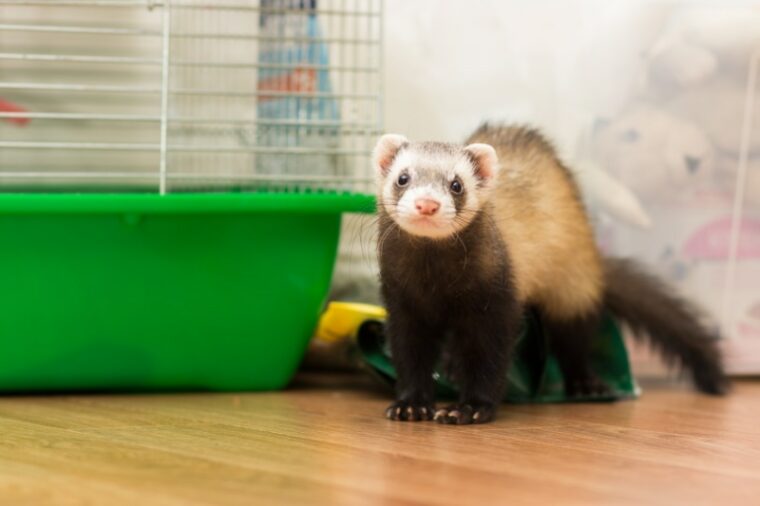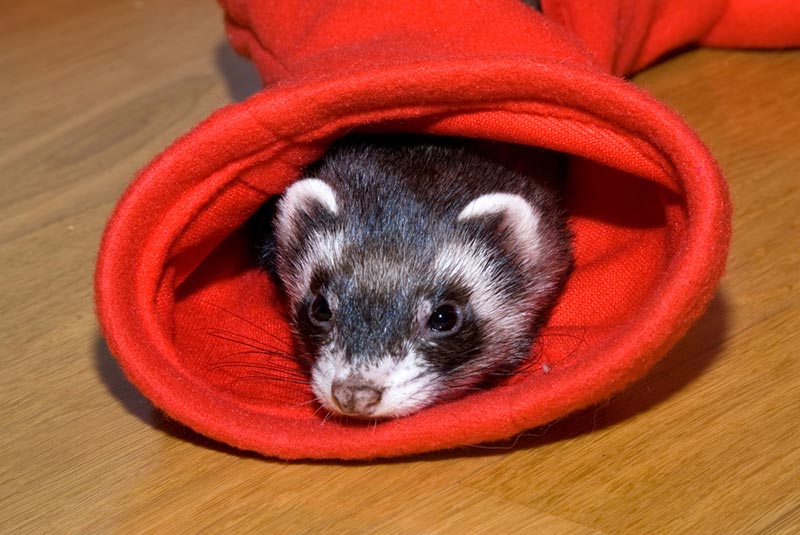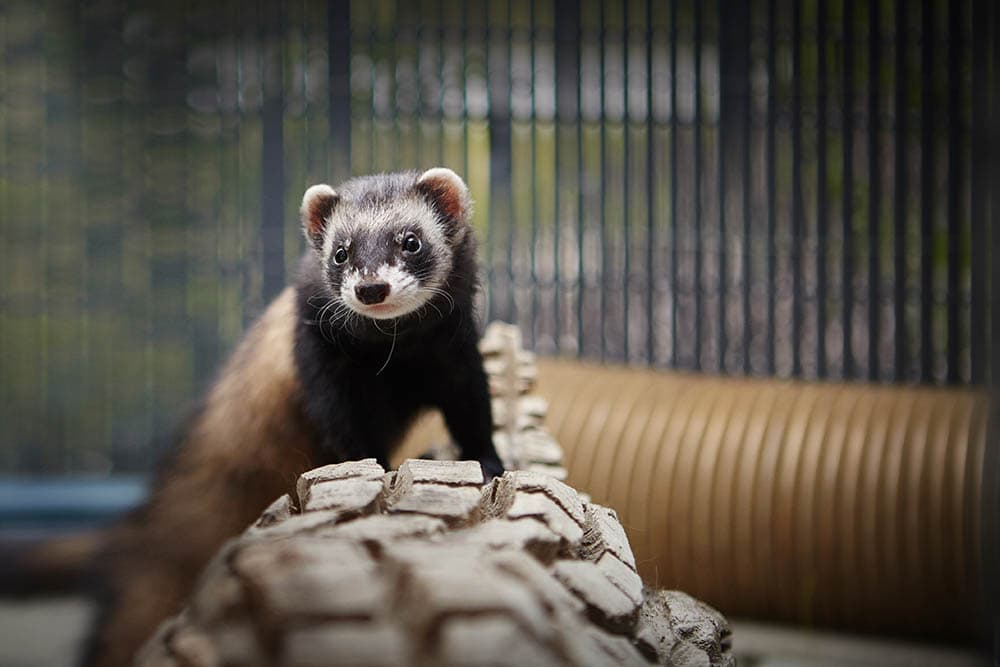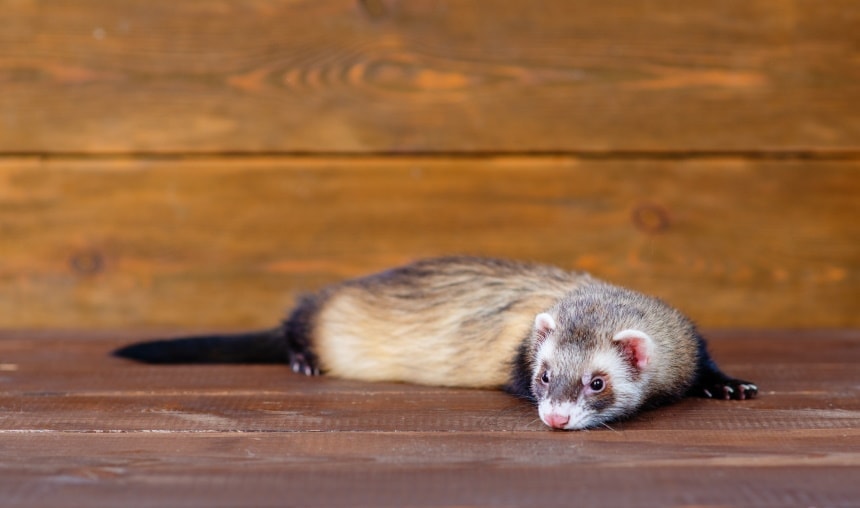
Click to Skip Ahead
Ferrets are great pets for owners who want to experience caring for a highly intelligent and playful animal that is very interactive with their owners. Owning ferrets is much more complicated (and expensive!) than many people think, though.
These intelligent animals need a large cage and plenty of mental and physical stimulation to be kept happy in captivity. It is important to ensure that you purchase all the correct supplies before you get a ferret so that you can be prepared to care for these furry friends properly.
The 7 Essential Ferret Supplies
Food and Feeding
1. Food
Ferrets are strict carnivores that have a short digestion period, so it is important to feed them high-quality food that can help them maintain their health and energy levels while ensuring that they get all the nutrients they need. Make sure to stock up on high-quality ferret food that has at least between 32% and 40% protein, 18%–22% fat, and low fiber at 2%–4%.
It is best to feed your ferret a diet that is specifically designed for them and the protein must be animal-based. If you switch your ferret’s diet from the one they were fed on before being in your care, you will need to slowly wean them off their current diet so that you do not upset their stomach.
2. Food and Water Bowl
Your ferret will need a food and water bowl to eat and drink out of. It is recommended to choose dishes that are too heavy for your ferret to move around and in cases where your ferret spills and tries to play with their bowl, it might be better to choose a food and water dish that can clip onto the cage.
Hydration is important for ferrets, so ensure that their water dish is always kept clean, and the water is replenished often. Once a week, you can wash your ferret’s food and water bowls to help prevent dirt and mold from accumulating.
Entertainment
3. Toys
These highly intelligent animals love to play and explore. If your ferret does not have a lot of toys, then it can become bored quickly. Boredom in ferrets can lead to unwanted behaviors and even possibly cause your ferret to become depressed. Mental and physical stimulation is important, so make sure you stock up on a variety of ferret toys to keep them active.
There are many different types of ferret-safe toys that contain no small parts that can be chewed and accidentally eaten. It is best to rotate the types of toys you give them so that they do not get bored of just one toy.
Comfort
4. Cage
A cage is the first and most important supply you will need for a ferret. This will be where your ferret spends most of its time and it is a safer option in comparison to letting your ferret roam freely in your home. It is possible to ferret-proof a room in your house where your ferret can stay without a cage, but most ferret owners will agree that getting a large cage to support your ferret is the better option.
A stainless steel or wire cage with a solid bottom is a suitable type of cage for ferrets. The cage should be quite large to support your ferret and is it a bonus if the cage comes with built-in ramps because you will not need to add these in separately. If the cage has barred ramps or surfaces, then you should add a protective layer such as linoleum on top so that it does not hurt your ferrets’ paws.
The cage will also need to have somewhere for your ferret to sleep. They enjoy sleeping and exploring in suspended cubes, tubes and hammocks.
5. Carrier
If you plan to transport your ferret, then it is important to have a safe carrier on hand. You can place your ferret in a carrier if they need to go to the vet, be moved safely to a different room, or if they will be leaving the security of their cage or ferret-proofed room. It is also a good idea to have a carrier on hand when you first collect your ferret so that you can safely transport them home without having to improvise and use a box or other carry method that they can chew and escape from.
6. Litter Box
Most ferret owners find that litter box training their ferret works well. This makes it easier to keep your ferret’s cage clean to provide them with a more hygienic environment because you will only need to remove and clean the litter box when it becomes soiled. Litter boxes can also help prevent your ferret from leaving accidents around the house. If you let your ferret free roam in a safe environment, then you might want to have a second litter box available for your ferret in that specific area.
7. Litter/Substrate
If you use a litter box, then you will need litter to place inside of the box. Avoid using clumping litter in your ferret’s litter box, along with any litter that is dusty or releases harmful toxins when exposed to wetness.
The phenols released from pine and cedarwood shavings can emit toxic chemicals and odors, so it is best to stick to safe ferret litter that is great for odor control without negatively impacting your ferret’s health. Additionally, you can also layer the bottom of your ferret’s cage with litter if they are not fully litterbox trained.
Some ferrets also enjoy digging, so having a digging box with ferret-safe litter can be a good investment. Paper-based substrates are the best option for ferrets when it comes to their litter box and lining their cage.
Summary
Once you have all the essential supplies you need to keep your ferret happy, then you can start buying them additional supplies such as collars or treats. The cage, litter box, bowls, and toys will be a once-off purchase, however, you will need to buy litter and food when required.
The starting cost of the supplies when you first get your ferret can be a lot, but once these purchases have been made, you will find that the maintenance cost is relatively affordable in comparison to other pets such as rabbits and guinea pigs. It is also worth noting that you should have fees for veterinarian appointments set aside in case your ferret needs an emergency stop at the vet.
See also:
Featured Image Credit: Fayzulin Serg, Shutterstock
















